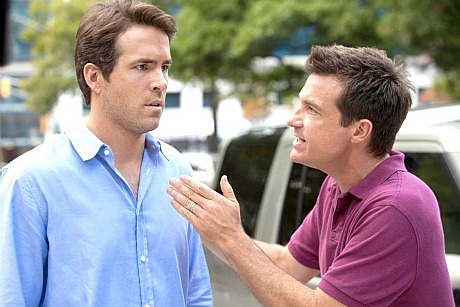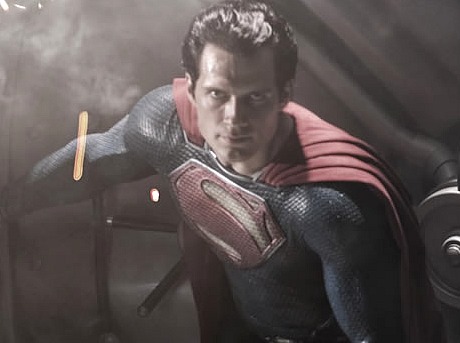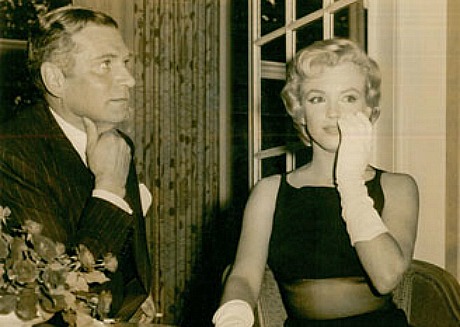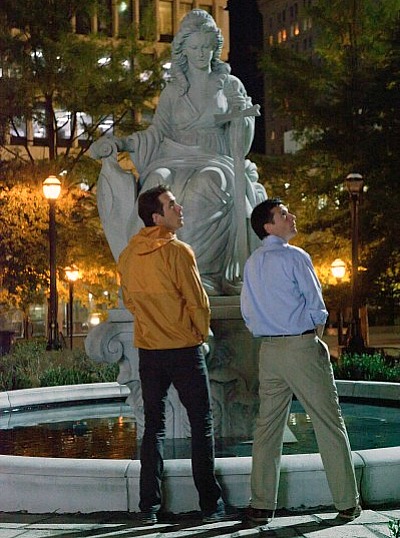A compassionate assessment of David Dobkin‘s The Change-Up (Universal, 8.5) would be to call it a schizophrenic experience — a film with a split personality. It’s awful at first — “odiously vulgar” and “oppressively unfunny” are fair descriptions of the first 45 or 50 minutes. But then it improves when the characters suddenly “get real” and settle into intimacy and character and reality-facing issues, and the film stops playing to the cretins out there who squeal with laughter at poop, piss and dick jokes.

Ryan Reynolds, Jason Bateman in
. The first section, seemingly written and directed by a depraved, brain-dead, subhuman 13 year-old, delivers the basic story or set-up. A stressed-out, married-with-kids attorney (Jason Bateman) magically swaps lives and bodies with his immature pseudo-actor buddy (Ryan Reynolds) after they urinate into a kind-of magic fountain and say “I wish I had your life” (or words to that effect) at the exact same instant.
The second section, which is much more tolerable and even affecting here and there, is about these guys gradually realizing who they really are and what their lives truly amount by being able to stand outside themselves and assess from an outside perspective.
Bateman and Reynolds and costars Leslie Mann, Olivia Wilde and Alan Arkin handle their roles with professional aplomb and, as much as possible, a measure of dignity. Bateman and Reynolds do their level-best to make the sickeningly stupid parts play as well as possible, and the others “do the job” as best they can. Wilde is especially good as a sexy office colleague of Bateman’s attorney who develops an emotional-sexual interest when Reynolds’ personality takes over. She hits some genuinely honest notes.
But the depraved, brain-dead, subhuman 13-year-old section so thoroughly poisons the well that even the better second half of The Change-Up can’t quite balance things out. It’s a shame because Dobkin and his colleagues could have have made a reasonably decent comedy about values and choices and maturity and all that. But the animal sensibility (which the notoriously low-rent producer Neal Moritz probably had something to do with) wins out.
Complaint #1: What kind of moron pees into a public fountain? Even pot-bellied 20something apes who wear backwards baseball hats and oversized T-shirts and Kevin Smith shorts and sneakers with no socks are civilized enough to piss on the grass or in some bushes or against a tree. If I saw two guys pissing into a public fountain I’d run over and push them in and then run for it.
Complaint #2: Robo-babies who slam their heads against crib bars aren’t funny. Robo-babies who shoot a dark-brown milkshake substance out of their anuses and into Jason Bateman’s mouth aren’t funny, and the guys who thought this sequence up have something wrong with them…seriously. You’re sitting there and thinking, “Somebody actually got paid money to think this up and then shoot it for a mainstream big-studio feature?” Only a society in the last death throes of social degeneration and corruption would laugh at a scene as low as this, and believe me, hundreds were laughing their asses off at Monday night’s screening. I’m not talking about the vulgarity (although I am to some extent) — I’m talking about the primitive mentality that would find this kind of thing even faintly amusing.
Complaint #3: I wasn’t sure what was going on at first with the switch-out. It turns out that Bateman and Reynolds are not doing a Warren Beatty-in-Heaven Can Wait number but an internal personality switch. Beatty’s appearance stayed the same for us but once he occupied the body of billionaire Leo Farnsworth he physically appeared as Farnsworth to the other characters. But when Bateman “becomes” Reynolds and vice versa in The Change-Up their personalities are their own but their appearance is seen as one and the same by the audience and the characters. And that threw me at first because I had Heaven Can Wait in my head. Is this confusing?
Complaint #4: The basic Hollywood Elsewhere rule about driving scenes is that the driver has to act like a real driver in real life, which is to say he/she almost never takes his/her eyes off the road…ever. Bad movies allow drivers to frequently look at their passenger while driving, sometimes for three or four seconds at a time. But in one Change-Up scene Bateman takes things to a new level by mostly looking at the front-seat passenger and only glancing at the road or a second or two. I scream inside when I see this. You’re driving, asshole! You could kill someone! The bad guy, of course, is Dobkin, not Bateman. He could have straightened this out by reminding Bateman of the HE rule, but no.





